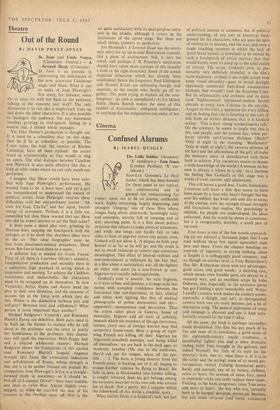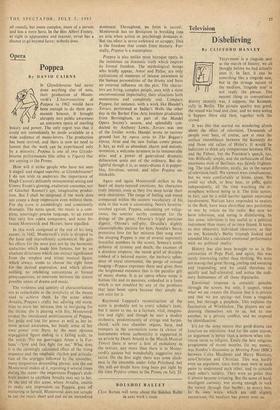Cinema
Confused Alarums
By ISABEL QUIGLY The Little Soldier. (Academy; 'X' certificate.)—Tom Jones. (London Pavilion; 'X' cer- tificate.)
JEAN-LUC GODARD'S LC Petit Soldat, which has been banned for three years as too topical, too controversial and in general too embarrassing for export, turns out to be an intense, unlikeable work, highly interesting, hugely depressing, and strangely 'clinging,' one of those films whose images hang about afterwards, hauntingly nasty and antiseptic, secretly full of meaning and of dire, alarming point. It is a film about politics in action that refuses to make political statements, and while one longs, can hardly fail, to take sides, to hate or approve before any action, even, Godard will not allow it. 'A plague on both your houses' is as far as he will go, and the result is not so much balanced as remote and sometimes meaningless. This effect of blurred outlines and non-commitment is enhanced by the fact that, in a film about a nationalistic war, all the fighters on either side seem (to a non-French or non- Algerian eye) racially indistinguishable.
Godard's tone is neutral; his style hygienic, as it were urban, and dateless, a strange style that moves with complete confidence between the functional (the sub-functional, in fact, clinical and white, with lighting like that of medical photographs or police documents) and the- apparently—spontaneous and decorative. Thus the action takes place in Geneva, home of neutrality, hygiene and all sorts of urbanity, beneath which the monsters of the age (terrorism, .torture, every sort of foreign horror) may find temporary house-room. Here a group of right- wing French are killing off their Algerian (or Algerianly-attached) enemies, and being killed off themselves: we are back in the dark ages, so modernly familiar ('He was in the bathroom, they'd cut out his tongue, taken off his eye- lids . .'). The hero, a young deserter from the French ,army, is backing out of it all, hoping to escape.iurther violence by flying to Brazil. He falls in, love, is blackmailed into further killing, is caught, tortured, finds his girl belongs among his torturers, loses her to his own side who torture her to, death. Not a pretty, but suppose within the framework of our world a credible, story.
What mainly limits it is Godard's lack, not just of political interest or comment, but of political understanding, of any sort of historical back- ground for his characters, who are seen (in spite of references to parents, and the war, and even a single touching moment in which the lack of 'good brave causes' is bewailed) to be moved by such a hotchpotch of trivial motives that they would hardly seem to stand up to the solid reality of torture. The script, Godard's own, so pre- sumably very definitely intended, is the film's main weakness: without it one might accept even some visual absurdity—guns in broad daylight apparently unnoticed, ham-fisted assassination attempts that wouldn't fool the Keystone Cops. But its whimsicality and archness and its quite lurid 'highbrowness' (perpetual-student brand) obtrude at every turn, Cocteau in the car-ride, Aragon on the train, a quotation for every killing, and no feeling that one is listening to this sort of talk from an artistic distance, that it is Godard saying: 'This is how young revolutionaries talk.' On the contrary, he seems to imply that this is life, and people, and the present day; while per- fectly terrible sub-Cocteau dialogue ('Bach?' 'Only at eight in the morning.' Beethoven?' 'Only at eight at night'), the extreme dimness of the hero and the affectedness of the girl, all make the necessary sense of identification with them hard to achieve. Flip comments meant to denote a wide knowledge of the world CA woman on her own is always a whore or a spy,' etc.) increase the feeling that Godard's at this stage was a world of cruel, narrow, ugly adolescents.
This still leaves a good deal. Faults, limitations, irritations still leave a film that seems to have been made by a man who hasn't thought but has seen his subject, has lived and seen life in terms of the cinema, with the strength (visual strength) and limitations that implies. His psychology is childish, his people are undeveloped, his ideas unformed. And the world he shows is cancerous; but it is recognisably, horribly, a small part of our own.
Tom Jones is one of the few novels approach- ing (in my edition) a thousand pages that 1 can read without those few (quite agreeable) naps here and there. From the chapter headings on (marvels of ingenuity in saying nothing, often at length) it is unflaggingly good company; and so, though on another level, is Tony Richardson's film. Mr. Richardson starts with two advantages, good actors and good words: a dazzling cast, which means even humble parts are played in a masterly way, and an excellent script by John Osborne, that (especially in the narrative pal ts) has got Fielding's spirit remarkably well. Walter Lassally's camera work makes the country scenes, especially, a delight, and isn't, as distinguished camera work can too easily become, just a bit of decorative icing. The general impression of romp and rampage is pleasant and one is kept satis- factorily amused for the time it takes.
All the same, the book is (perhaps inevitably) much diminished. The film has got much of its fun and most of its bawdiness, a good sense of the eighteenth-century social crudeness, a (justifiably) tighter plot and a more dramatic ending (with Tom brought to the gallows, and indeed beyond); but little of its style (in the director's style, that is: what there is of it is in the script and the acting), none of its moral pre- occupations (which Fielding hammered pretty hard), and scarcely any of its variety, richness, satire or heart. No amount of noise, fury, speed or cinematic tricks can really replace these losses. Fielding, as the book progresses, takes Tom more and more to heart: the boy who was 'certainly born to be hanged' develops, moves pn, becomes not jugt more virtuous (and .bettei considered all round), but more complex, more of a person and less a mere hero. In the film Albert Finney, so right in appearance and manner, never has a chance to gó beyond farce: nobody does.







































 Previous page
Previous page